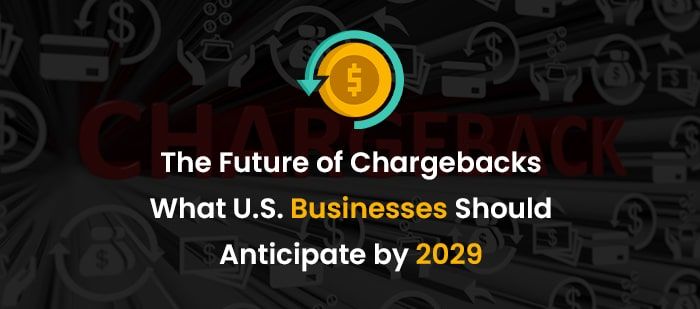
Introduction to Chargebacks
In the realm of digital commerce, chargebacks represent a significant challenge for U.S. businesses. These financial reversals occur when customers dispute transactions, often resulting in the return of funds. Initially created to protect consumers from fraudulent activities, chargebacks have evolved into a complex issue that can also financially strain merchants. To navigate this multifaceted landscape effectively, it’s critical for businesses to stay ahead of future chargeback trends in the U.S.
As we look toward 2029, businesses will need to be prepared for an array of changes that could impact chargeback management. Technological advancements will play a major role, with innovations such as artificial intelligence and blockchain offering new ways to tackle fraud and enhance transaction security. Simultaneously, regulatory changes are on the horizon, aiming to balance consumer protection with merchant rights. Companies will need to adapt quickly to these new policies to avoid penalties and maintain compliance.
Consumer behavior is also a key factor influencing chargebacks. With the growing prevalence of online shopping, customer expectations around refund processes are becoming more demanding. This shift necessitates that businesses refine their refund and customer service practices to prevent disputes from escalating into chargebacks. Understanding these dynamic elements is essential for U.S. businesses striving to manage chargebacks effectively in the future.
Some Related Blogs
- Preparing for a Chargeback Audit: Critical Steps for U.S. Companies
- Chargebacks in High-Risk Industries: Specialized Solutions for U.S. Enterprises
- How U.S. Financial Institutions Manage Chargebacks: Key Insights for Businesses
- The Role of Customer Support in Preventing Chargebacks: Insights for U.S. Enterprises
Technological Progress
Technology is transforming how businesses address chargebacks, with AI playing a key role. These systems can sift through massive datasets to detect patterns and anomalies indicative of potential fraud, streamlining the review process. By reducing the time and cost associated with managing chargebacks, AI helps resolve disputes more efficiently.
Blockchain technology also holds promise for reducing chargeback fraud. As a decentralized ledger, blockchain offers enhanced transparency and security in transactions. Its immutable record-keeping makes it challenging for fraudulent chargebacks to succeed, providing a reliable source of evidence in disputes. Businesses adopting blockchain can expect fewer fraudulent claims and improved operational efficiency.
Additionally, real-time data analytics can significantly enhance chargeback management. These tools allow businesses to monitor transactions as they happen, quickly identifying and addressing issues before they escalate into disputes. Enhanced data analytics enable companies to fine-tune their fraud detection strategies and optimize their response times.
Biometric authentication methods, such as fingerprint and facial recognition, are becoming more common in transaction processes. These methods add an extra layer of security, making it harder for unauthorized users to initiate transactions and reducing the likelihood of chargebacks stemming from identity theft.
As these technological innovations become more integrated into business operations, companies will find themselves better equipped to handle the complexities of chargebacks, ultimately safeguarding their revenue and improving customer satisfaction.
Changes in Regulations
Regulatory bodies are poised to introduce new policies affecting chargeback procedures, focusing on bolstering consumer protection while addressing merchant concerns. Companies must stay updated on these changes to ensure compliance and avoid penalties.
![]()
Email us anytime!
Email customer service 24/7
![]()
Call us anytime!
Reach customer care 24/7 at +1 (888) 901-8653
Investing in adaptable systems is essential for meeting new requirements. This could involve revising dispute resolution processes, training staff on regulatory updates, and adopting technologies that facilitate compliance. By being proactive, businesses can mitigate disruptions and maintain smooth operations.
Additionally, keeping abreast of industry standards and best practices will be crucial. Participating in industry forums and engaging with regulatory bodies can provide valuable insights into upcoming changes. Companies should also consider collaborating with compliance experts to navigate the complexities of new regulations.
Implementing robust monitoring systems will help businesses quickly adapt to regulatory changes. These systems can track regulatory updates and ensure that internal processes remain aligned with current requirements. By staying vigilant, companies can minimize the risk of non-compliance and protect their operations from potential legal and financial repercussions.
Shifts in Consumer Behavior
As consumer habits continue to shift, businesses must stay alert to how these changes influence chargebacks. In today’s digital age, consumers demand fast, effortless refund processes, prompting businesses to streamline their refund policies and procedures. Simplifying these processes helps in minimizing disputes and the resultant chargebacks.
The surge in online shopping further amplifies chargeback volumes. More consumers are turning to e-commerce, which increases the likelihood of disputes due to factors such as delivery delays or unmet product expectations. Businesses need to focus on enhancing customer service and offering clear, precise product descriptions to prevent misunderstandings that could lead to chargebacks.
Moreover, the rise of mobile commerce adds another layer of complexity. With more transactions occurring on mobile devices, businesses must ensure their mobile platforms are user-friendly and secure to reduce potential errors or fraud that might trigger chargebacks.
Subscription-based services also present unique challenges. Customers often forget about recurring charges or feel misled about subscription terms, leading to disputes. Transparent communication regarding billing and easy cancellation options can help mitigate these issues.
Personalization in marketing and customer interactions is becoming increasingly important. Tailored experiences can boost customer satisfaction and loyalty, but they also necessitate careful handling of customer data. Secure, ethical data management practices are essential to maintaining trust and minimizing the risk of chargebacks.
By understanding and adapting to these evolving consumer behaviors, businesses can better manage chargebacks and enhance overall customer satisfaction.
Strategies for Preventing Fraud
Businesses can adopt several strategies to reduce chargeback fraud effectively. Utilizing advanced fraud detection tools that leverage machine learning algorithms can significantly aid in spotting and flagging suspicious activities in real-time. These tools help distinguish between legitimate and fraudulent transactions, making it easier to manage potential risks.
Additionally, businesses should prioritize data security by implementing robust cybersecurity measures. Regularly updating software, encrypting sensitive information, and conducting security audits are critical steps in safeguarding customer data. Employee training programs focusing on security awareness can further enhance the company’s defense against potential breaches.
Implementing multi-layer authentication methods, such as two-factor authentication, can also fortify transaction security. This added layer of verification makes it harder for unauthorized users to complete fraudulent transactions.
Clear communication with customers about transaction policies, return procedures, and dispute resolution processes can help reduce misunderstandings that lead to chargebacks. Transparent and straightforward customer service practices build trust and can prevent disputes from escalating.
By combining these advanced techniques with strong security protocols and clear customer communication, businesses can better protect themselves from chargeback fraud, ensuring smoother operations and enhanced customer satisfaction


